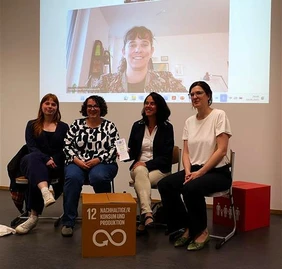Professor Julia Blasch from Technische Hochschule Ingolstadt made it clear that individual consumer decisions are not enough. ‘We live in a consumption-oriented system,’ said Blasch, ’and need political incentives to promote the circular economy and new forms of mobility.’ Laura Beyeler from BTU Cottbus-Senftenberg also emphasised that sustainable consumption needs to be considered from a social perspective with the ‘consumption corridor’ model - a guideline with clear ecological upper limits. Local examples showed what change can look like in concrete terms: Over 1,600 everyday objects have already been repaired collectively at the Neuburg Repair Café. ‘It's not about giving something away, but about learning together how to repair things,’ said organiser Stefanie Martin. The city library also lives by the principle of shared use, with around 155,000 loans last year. Particularly popular: Tonieboxes and Edurinos for children. Vivienne Kleinschmidt from the Our Future e. V. association provided a student perspective on sustainable everyday practices - with swap shelves, urban gardening and clothes swaps on campus. Projects that don't lecture, but invite people to join in. The conclusion: sustainability is created where structures change - and people act together. |


![[Translate to English:] Logo Akkreditierungsrat: Systemakkreditiert](/fileadmin/_processed_/2/8/csm_AR-Siegel_Systemakkreditierung_bc4ea3377d.webp)








![[Translate to English:] Logo IHK Ausbildungsbetrieb 2023](/fileadmin/_processed_/6/0/csm_IHK_Ausbildungsbetrieb_digital_2023_6850f47537.webp)


